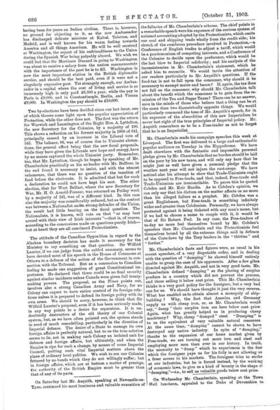Mr. Chamberlain's facts and figures were, as usual in his
recent speeches, of a very disputable order, and in dealing with the question of "dumping" he showed himself entirely unable to grasp the case of his opponents. After a few gibes directed against Mr. Asquith, and not in very good taste, Mr. Chamberlain defined " dumping " as the placing of surplus produce in a country which did not prevent the process, and there selling it below coat price. This Mr. Chamberlain thinks is a very good policy for the foreigner, but a very bad one for us. We should have thought it just the very reverse. What has enabled us to obtain almost a monopoly of ship- building ? Why, the fact that America and Germany supply us with cheap iron, or, as Mr. Chamberlain would say, " dump " their surplus iron ore here below cost price. Again, what has greatly helped us in producing cheap machinery ? Why, cheap " dumped " steel. "Dumping" is to us the equivalent of very valuable natural resources. At the same time, " dumping " cannot be shown to have destroyed any native industry. In spite of " dumping," thanks to the expansion of our home market given by Free-trade, we are turning out more iron and steel and employing more men than ever in our history. In truth, the necessity to " dump " which he experiences is the fine which the foreigner pays us for his folly in not allowing us a freer access to his markets. The foreigner tries to strike at our industries, but he is forced instead, by the working of economic laws, to give us a kind of bounty in the shape of "dumping,"—i.e., to sell us valuable goods below cost price.


















































 Previous page
Previous page